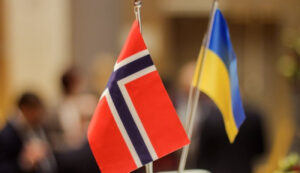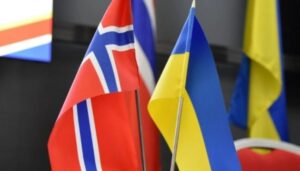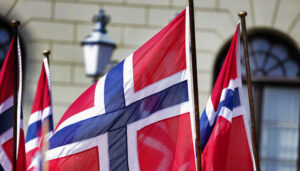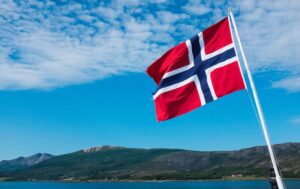
Norway will allocate 6.5 billion Norwegian kroner ($644 million) to purchase drones and drone equipment from Ukrainian and other European manufacturers for Ukraine’s needs, the government’s website reported on Wednesday.
“Drones play an important role in Ukraine’s struggle for its defense. They are important both for the protection of critical infrastructure and for use on the front line. Norway’s assistance will significantly improve Ukraine’s ability to carry out the necessary surveillance and operations with the help of drones,” Norwegian Prime Minister Jonas Gahr Støre was quoted as saying on the website.
According to the information, Norway officially joined the Coalition for the Development of Unmanned Technologies in April and previously announced its intention to increase support for the Ukrainian defense industry and purchase drones for Ukraine.
This is reportedly the first large-scale purchase of drones directly from foreign manufacturers. This is in line with one of the goals underlying the decision made in March of this year by the Storting (Norwegian National Assembly – IF-U) to increase support for Ukraine by 50 billion Norwegian kroner (about $5 billion) by 2025.
The Norwegian government prioritizes meeting military needs based on what Ukraine itself identifies as the most important.
“Funding for the procurement of unmanned aerial vehicles will help to create an independent Ukrainian deterrence system, which will also be important after a potential peace agreement… We will continue to focus our support on maritime security, air defense, unmanned aerial vehicles and autonomous systems. We will also prioritize support for the procurement of defense equipment from Ukrainian manufacturers and cooperation between the Nordic and Baltic countries to equip and train new Ukrainian military units,” said Defense Minister Thorbjørn Sandvik.
It is noted that the support provided and “lessons learned from the war in Ukraine will also help strengthen the Armed Forces and defense capabilities of Norway.”
Source: https://www.regjeringen.no/en/aktuelt/norway-to-provide-nok-6.5-billion-for-procurement-of-drones-for-ukraine/id3111763/

The Ministry of Development of Communities and Territories of Ukraine (Ministry of Development) and the Ministry of Transport of Norway have agreed to extend the liberalization of freight transport until the end of 2025 with the possibility of automatic renewal.
“Transport visa-free travel” is about strengthening economic ties, saving resources, and improving business efficiency. I am grateful to our partners in the Norwegian government for supporting this decision. We are working to expand these opportunities next year,” said Deputy Prime Minister for the Restoration of Ukraine, Minister of Community and Territorial Development Oleksiy Kuleba in a press release.
It is noted that the liberalization of transport with Norway has been extended for the second time. The first such agreement between the countries was reached in August 2023. To date, “transport visa-free travel” is available with 35 countries, including the EU.
The Ministry of Development reminds that drivers must have a certificate confirming the environmental class of the vehicle on board in order to take advantage of the transport liberalization conditions.
As reported, in April, “transport visa-free travel” between Ukraine and the EU was extended until the end of 2025.

Norway will allocate 2.7 billion kroner ($242.38 million) to strengthen the Ukrainian navy and help deter Russian naval forces in the Black Sea, Prime Minister Jonas Gahr Støre said, Reuters reports.
“It is necessary to protect the population and infrastructure of Ukraine from attacks by the Russian Black Sea Fleet,” Reuters quoted the Norwegian prime minister as saying on Monday.
“It is also important to protect the export of grain and other products by sea, which bring Ukraine its most important revenues,” he added.

Norway is allocating an additional NOK50 million ($4.5 million) to the Grain from Ukraine initiative.
According to the Norwegian government’s website, the new contribution underscores Norway’s commitment to supporting global food security and helping countries most affected by hunger and high food prices.
“Norway’s expanded support underscores its commitment to preventing hunger and promoting stability in regions most affected by the global crises. We support this initiative, and we also support increasing local food production in the Middle East and Africa,” said Norway’s Minister for Development Cooperation, Anne Beate Christiansen Tveinnerheim.
The Grain from Ukraine initiative, launched by Ukrainian President Volodymyr Zelenskyy in November 2022, ensures the safe transportation of Ukrainian grain to developing countries, especially in the Global South. This program became especially important after Russia withdrew from the Black Sea Grain Agreement in July 2023, which caused an immediate increase in global food prices.
The initiative has delivered over 170 thousand tons of Ukrainian grain to countries such as Somalia, Ethiopia, Kenya, Yemen and Gaza. These vital deliveries have provided much-needed assistance to regions such as Gaza, where more than 90% of the population faces acute food shortages.
Norway’s latest contribution of NOK50 million follows an earlier pledge of NOK100 million to the initiative. In total, the program has received commitments of more than $250 million from more than 25 countries. This funding has helped boost Ukraine’s grain and oil exports, which before the war accounted for more than 15% of global grain exports and more than 50% of sunflower oil exports.

The Norwegian government will provide Ukraine with an additional 500 million Norwegian kroner through the World Bank’s multilateral donor fund for assistance, recovery, reconstruction and reforms in Ukraine URTF.
“Today, during the 2024 annual meetings of the International Monetary Fund (IMF) and the World Bank Group (WBG), Norway’s Minister for International Development, Ann Beate Christiansen Twinneraim, met with Ukrainian Finance Minister Serhiy Marchenko and pledged to provide an additional 500 million Norwegian kroner to the fund,” the Norwegian government website reported on October 24.
As reported, NPC Ukrenergo received the first large cross-regulation transformer for one of the 750 kV substations (SS) as part of the REPOWER project from the World Bank (WB), which is financed by a grant of $247 million from the URTF fund. In the coming months, after the completion of production, almost 20 more powerful transformers purchased with WB funds are expected to arrive.
“On the eve of winter, it is vital to provide the population of Ukraine with electricity and heat. That is why we recently announced the allocation of 3 billion Norwegian kroner, which, among other things, will be used to provide electricity to almost 1.5 million people and industry in Ukraine, as well as for other assistance so that the war-affected population can survive the winter,” Twinnerem said.
As reported, in October this year, the Norwegian government proposed to extend the Nansen program until 2030 and expand the funding from at least 75 to 135 billion Norwegian kroner during this period.
“My main message during our meeting was that Norway should support Ukraine for as long as necessary. This is in the interests of both Ukraine and Norway, and the long-term Nansen program reflects this commitment,” the Norwegian Minister for International Development emphasized.
The Nansen support program for Ukraine includes military support, humanitarian assistance, funding to support civilian infrastructure and critical societal functions, as well as funding to support the reconstruction of Ukrainian society when possible. Since Russia’s full-scale invasion of Ukraine in February 2022, Norway has provided Ukraine with almost 52.6 billion Norwegian kroner, of which approximately 28 billion was allocated for military support and 24 billion for civilian support.

Norway, in partnership with the United Nations Development Program (UNDP), has committed a total of NOK 1.1 billion ($105 million) in financial support to rebuild Ukraine’s energy infrastructure, build backup capacity and accelerate Ukraine’s transition to a more diversified and sustainable energy mix.
“This partnership will ensure the restoration of energy generating capacity in Ukraine, providing direct support to important regions of Ukraine. This contribution will significantly mitigate the impact of the ongoing shelling of Ukraine’s energy infrastructure. As part of this enhanced partnership, solar panels will be installed to provide backup power to schools and hospitals, and a recent agreement will provide an additional 80 MW of power to the national grid this winter,” the UN press service reports.
It is noted that thanks to the UNDP Energy Recovery Program, the provision of heat and water will meet the needs of more than a million people and industrial consumers.
“Russia’s constant attacks on Ukraine’s energy infrastructure have led to an urgent need to increase electricity production. There is a shortage of this type of equipment on the market. Therefore, the agreement with UNDP is very important to support Ukraine this winter,” Norwegian Foreign Minister Espen Barth Eide said in a government press release.
The production, transportation and installation of energy equipment are complex and risky processes that are carried out by reliable partners, as this is vital assistance that will enable Ukraine to survive the coming winter.
“We are committed to supporting Ukraine in its efforts to build a more resilient and sustainable energy system by restoring critical energy infrastructure and generation capacity, and advancing strategic initiatives to accelerate the transition to green energy. We are committed to supporting Ukraine in its efforts to build a more resilient and sustainable energy system. Rehabilitating critical energy infrastructure is essential as people living in multi-storey buildings in major cities have no alternative means of heating and water supply. UNDP’s Renewable Energy Program, through which we are supporting Ukraine’s energy recovery, is a testament to our commitment to promoting green recovery and energy security for all Ukrainians. We are grateful to our partners for their continued support,” said UNDP Resident Representative Jaco Silje.